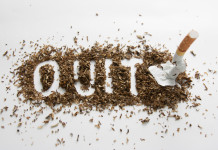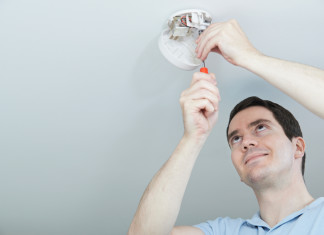People who want to quit smoking and fear gaining weight need to develop a physical fitness plan and modify their diets to accommodate the metabolic changes their bodies will experience. The health risks of smoking outweigh those of gaining some weight.
“We hear a lot, I’d rather smoke than be fat” says Keith Van Gasken, director of smoking cessation for Health Management Resources, a national weight control company. “The stigma of being overweight is worse than the stigma of smoking. You’re only a smoker when you have a cigarette in your mouth at 10:00 a.m. in front of your office building because you’re not allowed to light up inside. But when you’re overweight, you’re overweight all the time.”
Traditionally, health professionals have tried to downplay the weight gain that comes from smoking cessation by explaining that the average number of pounds put on when people give up cigarettes - about 10 - is not enough to make a thin person fat. And they’ve Pointed out that the smoking habit that kills more than 400,000 people a year in this country is far worse for health than a little extra weight.
In fact, according to some estimates you’d have to gain 100 to 150 pounds after quitting to make your health risks as high as when you smoked, which is why experts generally recommend that people kick the deadly habit first and worry about weight later.
For those who can follow that advice, great. But to the person for whom 10 pounds is not the absence of a health risk but the difference between a size 10 and a size 12, health and longevity are not the decisive issues.
Recognizing that, some in the health care community have begun to address the issue on weight conscious smokers, own terms by developing strategies against weight gain they can start to use before they smoke their last cigarette. If worry over weight gain is keeping you from quitting, it’s better to have “all of your weapons firmly in place” ahead of time, says Martin Katahn, PhD, author of How to Quit Smoking Without Gaining Weight (W. W. Norton, New York) . It’s hard enough to get used to the habit of not smoking; the stress of trying to learn habits that keep down weight at the same time might be too overwhelming and lead the former smoker right back to his or her lighter.
Pre-smoking-cessation pointers:
* After you pick a quit date either a week, two weeks, or a month away, increase physical activity.
It’s crucial because after you stop smoking, you can no longer maintain your weight by eating the
number of calories you always did unless you burn more through a more active lifestyle. The reason is that smoking increases the metabolic rate, causing the body to burn more calories than it would otherwise. Once the smoking stops, something needs to take its place as a calorie burner. Exercise is the perfect solution because it not only burns calories but also reduces tension, something a smoker is probably going to feel when he or she first gives up the habit. Bonus: after you give up cigarettes and your lungs and the rest of your body recover, exercise gets easier - and more fun.
* Accustom yourself to a lower-fat diet rich in vegetables, fruits, and whole grains. If you make a habit of eating healthfully before you stop smoking, you’ll be less tempted to substitute caloriedense foods for cigarettes later on.
* Start eating breakfast. A lot of smokers don’t have a meal when they get up in their morning since what they feel like is a cigarette, not food. Then they eat a lot at night. But if you eat breakfast, chances are you won’t feel the need to overdo it later on in the day. Getting used to eating breakfast will really help once quit day comes; it gives your mouth something to do other than have a cigarette dangling from it. Moreover, it prevents the mid-morning low that is particularly apt to hit a recent quitter used to a cigarette pick-me-up.
Once you do quit
Certain strategies help keep off unwanted pounds once quit day has arrived:
* Find new ways to get the oral fix that previously came from smoking cigarettes. Dr. Katahn suggests sipping water or putting a straw or toothpick in your mouth. You can also chew gum or suck on a piece of hard candy, or crunch on a carrot or celery stalk.
* To keep your hands busy other than by holding a cigarette, finger a special coin or medallion that can symbolize your determination not to smoke every time the urge arises. Dr. Katahn, a former smoker, explains that the immediate urge for a cigarette lasts only five minutes. Thus, little coin pressing and chewing exercises that require just a few minutes are all it takes to get you through the “wave” of an urge. With time, those urges will come farther and farther apart.
* Don’t drink more coffee than usual to get you through the waves. Nicotine suppresses caffeine’s effects, so when you quit, any caffeine you consume feels like more than you were getting. If you take in even more caffeine on top of that, you can get really jittery and anxious, qualities that make it hard to stay resolved about not smoking anymore.
* Speak with your physician about chewing nicotine gum to get you over the hump in the first few months if you’re afraid you won’t be able to go it “alone.” It’s not as healthful as quitting cold turkey, but it does appear to help keep off extra weight in the initial stage of not smoking by making up for some of the slowdown in metabolic rate and thereby giving the new nonsmoker more time to adjust to his new weight-maintaining lifestyle habits. The initial stage of not smoking, incidentally, happens to be the only time a former smoker is prone to putting on pounds. It’s not as if someone who kicks the habit continues to gain weight for as long as she or he doesn’t smoke.
An encouraging point for those mulling over the decision to quit (a decision that in some cases is made five or six times before it “sticks”): Not everyone gains weight. “It isn’t as if you’re sentenced to a 10-pound weight gain,” says Health Management Resource’s Mr. Van Gasken. “If the average weight gain is 10 pounds per former smoker, one may gain 15 while another gains just five. Some people gain none at all. The question is, what are you eating/lifestyle habits to begin with? If you’re someone who has never struggled with weight, going on and off diets and all that, you probably won’t have much trouble after you kick the habit.
































